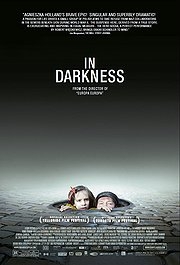In Darkness

Polish cinema is well-known not only for raising some of the world’s best directorial talents (Skolimowski, Polanski, Wajda, to name a few), but also for making some of the most miserable fucking films in existence. Being of Polish descent, I’m allowed to say that Polish films, particularly those covering historical events and Russians, often teeter on the edge of self-pitying cynicism. Wajda’s recent Katyn is a case in point; a brilliantly made film, but so bitter that you’ll need to stuff your face with fruity Mentos immediately after seeing it.
Agnieszka Holland’s Oscar-nominated In Darkness is a film that acknowledges Poland’s cynical tendencies, which are reflected brilliantly in its hero Leopold Socha (Robert Wieckiewicz). Socha is a sewer worker in the Nazi-occupied Polish city of Lvov who by chance stumbles upon a group of Jews who’ve burrowed their way from the ghetto into the sewers. Ever the opportunist, Socha and his co-worker cut a deal with the Jews in which he offers to hide them in the sewers in exchange for a tidy daily fee of 500 zlotys. When the Nazis clear out the ghetto, Socha sticks to his side of the bargain and begins a long period of keeping the Jews hidden in the murky canalways running under the city.
In Darkness is a hugely affective film, with Jolanta Dylewska’s cinematography in the sewers creating a dank and claustrophobic atmosphere that can be disorienting and tough to watch at times. Things aren’t much more pleasant aboveground as all around Socha the city is living in fear of regular Nazi round-ups, shootings and hangings. Socha manages to drift through this bleak landscape relatively undisturbed, thanks largely to his friend who works as a Nazi enforcer. This fragile sense of security is short-lived, however, as Socha takes greater and greater risks to keep ‘his’ Jews safe.

It’s hard not to be moved when you see Socha change from a mercenary – concerned only with the welfare of his wife and daughter – to someone prepared to risk his life for a group of people who, to start with, don’t even trust him. While comparisons to Schindler’s List will inevitably arise, Socha is not an all-out Messiah like Schindler. His personal journey is not only dangerous but, true to human nature, slippery. There are several points where he is genuinely tempted to abandon the Jews and come away from it considerably better off. And we don’t condemn him for it because, realistically, the same things would go through our minds.
Like Socha, we become familiar enough with the subterranean Jews to actually care about what happens to them. This is no doubt helped by the presence of two irresistibly cute and resilient children, but also by a couple of well inserted sub-plots. A burgeoning romance between Klara and Mundek (Benno Fürmann) is allowed to blossom as well as you could expect it to in a sewer, and the pregnancy of one of the other women raises the stakes even further.

The film is slowed down at a couple of points by excessive scenes showing Stocha’s Jews being either miserable or happy, depending on their mood that day. To a point, these scenes are essential and often touching, but many of them feel like they’re treading over the same soggy ground over and over again without adding to the plot. Also, for a film that for the most part upholds a powerful sense of realism, Socha seems to be a bit too lucky, having one too many narrow escapes in which something outside of his own control comes and saves his sewer-scouring hide.
These, however, are small gripes that only stand out because the majority of the film is sublimely made. With this film, Holland establishes herself as a veteran of strong, emotionally-charged cinema. For most of its 2-hour-plus running time, In Darkness feels oppressive and haunting, but that makes its moments of poignance – singing, laughter, love – all the more appreciable. It’s just a shame that in a film which charts personal journeys from hostility to camaraderie, Holland has to take a final swipe at human nature in the written epilogue. Those cynical fucking Poles.



Recent Comments